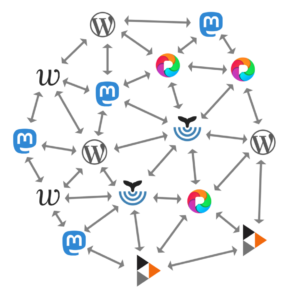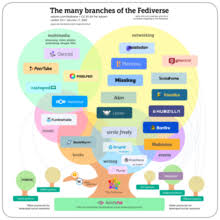Is the future federated? The fediverse is a new social protocol for everyone. A diverse community of interconnected social platforms powered by ActivityPub. The Fediverse (a portmanteau of “federation” and “universe”) is an ensemble of federated (i.e. interconnected) servers that are used for web publishing (i.e. social networking, microblogging, blogging, or websites) and file hosting, but which, while independently hosted, can communicate with each other.
Federated social media platforms represent a new way of thinking about online communities and communication. Unlike centralized platforms such as Facebook or Twitter, federated platforms operate as decentralized networks. This means they consist of multiple independent servers, known as “instances,” that communicate and work together to form a larger, interconnected system. Examples of federated platforms include Mastodon, Bluesky, PeerTube, and Pixelfed, each of which embodies this model of decentralization.
The fundamental difference between federated platforms and centralized ones lies in ownership and control. In centralized platforms, a single company manages everything: user accounts, content, and interactions. The decisions made by these companies (whether it’s how the feed is displayed, what content is allowed, or how user data is monetized) affect everyone on the platform without offering individuals much choice. Federated platforms, by contrast, allow each server or instance to operate independently. Every instance sets its own rules and policies, creating a diverse and customizable ecosystem. This decentralization ensures that no single entity has ultimate authority over the network as a whole.
Connectivity also differs between federated and centralized platforms. On centralized platforms like Facebook or Twitter, users can only interact with others who are part of the same platform. Federated platforms, however, allow users on different servers to connect seamlessly. For example, someone on a Mastodon server dedicated to art can interact with a user on another Mastodon server focused on activism. This interconnectedness preserves the benefits of broad communication while maintaining the independence of individual communities.
The federated model offers several advantages for users. One of the most significant is freedom. Users are not locked into a single platform and can move between instances without losing their connections or content. This flexibility allows people to find or create communities that align with their values, interests, and needs. Instances often cater to specific groups or topics, fostering a sense of belonging and shared purpose that can be harder to find on massive, centralized platforms.

Privacy and security are also key benefits of the federated approach. Unlike centralized platforms, which rely heavily on advertising and data collection to generate profit, many federated instances prioritize user privacy. These platforms often have fewer ads, less invasive algorithms, and a stronger commitment to protecting personal data. This makes them an appealing alternative for people who are concerned about the ways their information is used by corporate social media giants.
Another advantage of federated platforms is their emphasis on community-driven governance. Decisions about content moderation, platform features, and community standards are made at the local level by the administrators of each instance. This localized decision-making reduces the risk of arbitrary or profit-driven policies that often dominate centralized platforms. Users have more agency and can even create their own instances if they want to take full control of their online experience.
In many ways, federated platforms represent a return to the roots of the internet as a decentralized space where communities can thrive independently while remaining connected. They offer a refreshing alternative to the monopolistic tendencies of centralized social media, empowering individuals and communities to shape their digital environments. While federated platforms may require more effort to navigate and manage compared to centralized ones, their emphasis on freedom, privacy, and community makes them an increasingly attractive option for those seeking a more equitable and user-focused social media experience.

